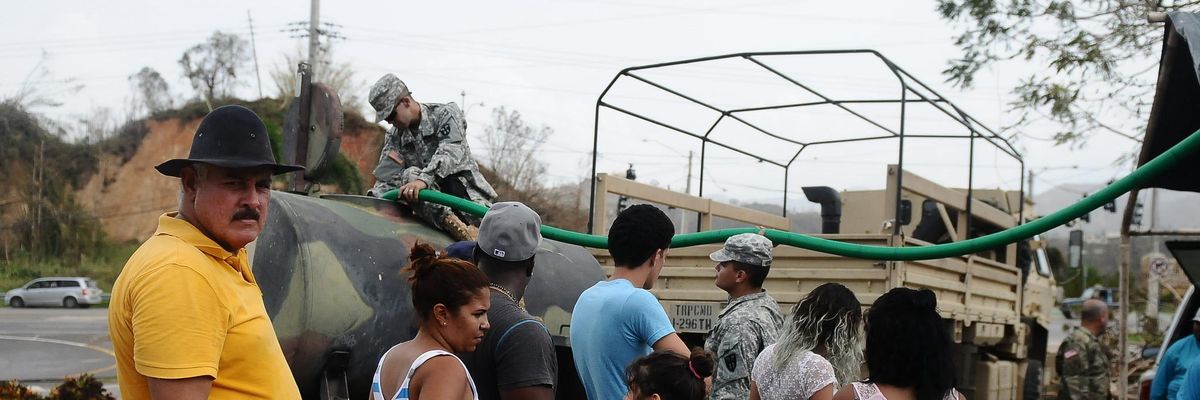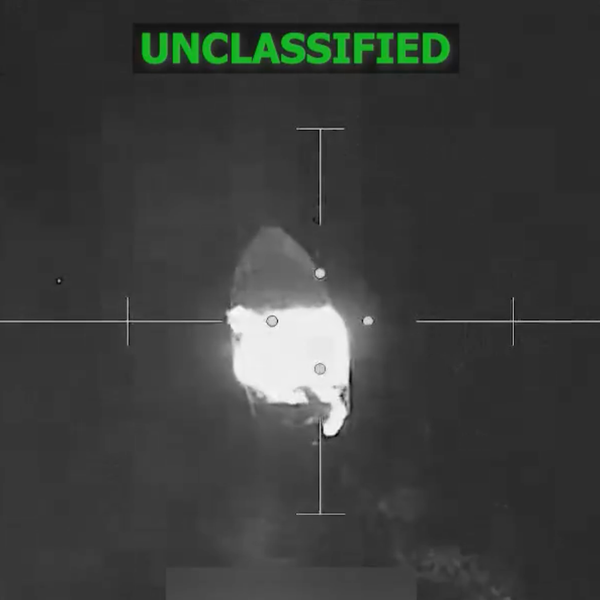
The Puerto Rican National Guard distributed water to residents on Tuesday, a week after Hurricane Maria devastated the island. (Photo: National Guard/Flickr/cc)
Katrina Comparisons Mount for Trump as Puerto Rico Screams for Bolder Response
"We need to get our shit together. I don't know how else to scream, and shout, and say it. This is the time for action."
As Puerto Ricans were stockpiling their few remaining resources on Wednesday, with some resorting to drinking water from streams according to news reports, President Donald Trump faced mounting criticism of his response--or lack thereof--to the devastation caused by Hurricane Maria's direct hit to the island territory last week.
Critics have warned that the crisis is likely to become for Trump the same kind of display of incompetence and mismanagement that Hurricane Katrina was for President George W. Bush in 2005.
As journalist Tim Dickinson wrote for Rolling Stone on Tuesday, "George W. Bush ate cake while New Orleans drowned--now Trump is making him seem statesmanlike by comparison."
Trump didn't make a public statement about the situation in Puerto Rico until Monday, when, as if in explanation of his silence, he tweeted that the island has "billions of dollars owed to Wall Street and the banks which, sadly, must be dealt with," and said that food and water are being delivered. Trump is not expected to visit the island until next week.
Seven days after the storm, nearly all of the island's 3.4 citizens are still without electricity, leading many to spend hours in lines every day waiting for fuel. Ninety percent of cell phone towers are down, leaving Puerto Ricans cut off from one another and the rest of the world, while 44 percent of residents are without drinking water.
Officials on the island have denounced the federal government for hamstringing many of the efforts of workers, with its lack of understanding of Puerto Rico's dire situation. San Juan Mayor Carmen Yulin Cruz spoke bluntly with CBS about the slow response of the federal government, noting that a week after the storm, much of the work being done is still assessment of the damage rather than actual relief work.
"Every moment we spend planning in a meeting, or every moment we spend just not getting the help we're supposed to get, people are starting to die already," Cruz said. "Boots are on the ground, help is here, I have doctors from HHS that wanted to help, eager to help, ready to help, but they didn't get any marching orders. Somebody has to structure the logistics of the aid getting in...We need to get our shit together. I don't know how else to scream, and shout, and say it. This is the time for action."
The Trump administration's refusal on Tuesday to waive the Jones Act is adding to fears that sufficient aid won't reach Puerto Ricans as quickly as it needs to. The Jones Act mandates that any cargo shipments between two U.S. ports must be carried out by American ships rather than foreign vessels, to avoid tax penalties. The law was suspended following the destruction of Hurricanes Harvey and Irma on the U.S. mainland, but the Trump administration declined to do the same for Puerto Rico, saying the territory's ports are too damaged to handle shipments.
The decision to keep the Jones Act in place was heavily criticized on social media on Tuesday.
\u201cBut Trump said that they were doing "everything they could" for #PuertoRico. \ud83e\udd14\ud83e\udd14\ud83e\udd14\n\nThey waived the Jones Act for FL and TX.\n#WednesdayWisdom https://t.co/xPwq2da9GO\u201d— Holly Figueroa O'Reilly (@Holly Figueroa O'Reilly) 1506517884
\u201c@SRuhle Jones Act was suspended during Katrina, Sandy, Harvey & Irma. Why not for Puerto Rico? This is an outdated law that has hurt Puerto Rico.\u201d— Stephanie Ruhle (@Stephanie Ruhle) 1506521393
An Urgent Message From Our Co-Founder
Dear Common Dreams reader, The U.S. is on a fast track to authoritarianism like nothing I've ever seen. Meanwhile, corporate news outlets are utterly capitulating to Trump, twisting their coverage to avoid drawing his ire while lining up to stuff cash in his pockets. That's why I believe that Common Dreams is doing the best and most consequential reporting that we've ever done. Our small but mighty team is a progressive reporting powerhouse, covering the news every day that the corporate media never will. Our mission has always been simple: To inform. To inspire. And to ignite change for the common good. Now here's the key piece that I want all our readers to understand: None of this would be possible without your financial support. That's not just some fundraising cliche. It's the absolute and literal truth. We don't accept corporate advertising and never will. We don't have a paywall because we don't think people should be blocked from critical news based on their ability to pay. Everything we do is funded by the donations of readers like you. Will you donate now to help power the nonprofit, independent reporting of Common Dreams? Thank you for being a vital member of our community. Together, we can keep independent journalism alive when it’s needed most. - Craig Brown, Co-founder |
As Puerto Ricans were stockpiling their few remaining resources on Wednesday, with some resorting to drinking water from streams according to news reports, President Donald Trump faced mounting criticism of his response--or lack thereof--to the devastation caused by Hurricane Maria's direct hit to the island territory last week.
Critics have warned that the crisis is likely to become for Trump the same kind of display of incompetence and mismanagement that Hurricane Katrina was for President George W. Bush in 2005.
As journalist Tim Dickinson wrote for Rolling Stone on Tuesday, "George W. Bush ate cake while New Orleans drowned--now Trump is making him seem statesmanlike by comparison."
Trump didn't make a public statement about the situation in Puerto Rico until Monday, when, as if in explanation of his silence, he tweeted that the island has "billions of dollars owed to Wall Street and the banks which, sadly, must be dealt with," and said that food and water are being delivered. Trump is not expected to visit the island until next week.
Seven days after the storm, nearly all of the island's 3.4 citizens are still without electricity, leading many to spend hours in lines every day waiting for fuel. Ninety percent of cell phone towers are down, leaving Puerto Ricans cut off from one another and the rest of the world, while 44 percent of residents are without drinking water.
Officials on the island have denounced the federal government for hamstringing many of the efforts of workers, with its lack of understanding of Puerto Rico's dire situation. San Juan Mayor Carmen Yulin Cruz spoke bluntly with CBS about the slow response of the federal government, noting that a week after the storm, much of the work being done is still assessment of the damage rather than actual relief work.
"Every moment we spend planning in a meeting, or every moment we spend just not getting the help we're supposed to get, people are starting to die already," Cruz said. "Boots are on the ground, help is here, I have doctors from HHS that wanted to help, eager to help, ready to help, but they didn't get any marching orders. Somebody has to structure the logistics of the aid getting in...We need to get our shit together. I don't know how else to scream, and shout, and say it. This is the time for action."
The Trump administration's refusal on Tuesday to waive the Jones Act is adding to fears that sufficient aid won't reach Puerto Ricans as quickly as it needs to. The Jones Act mandates that any cargo shipments between two U.S. ports must be carried out by American ships rather than foreign vessels, to avoid tax penalties. The law was suspended following the destruction of Hurricanes Harvey and Irma on the U.S. mainland, but the Trump administration declined to do the same for Puerto Rico, saying the territory's ports are too damaged to handle shipments.
The decision to keep the Jones Act in place was heavily criticized on social media on Tuesday.
\u201cBut Trump said that they were doing "everything they could" for #PuertoRico. \ud83e\udd14\ud83e\udd14\ud83e\udd14\n\nThey waived the Jones Act for FL and TX.\n#WednesdayWisdom https://t.co/xPwq2da9GO\u201d— Holly Figueroa O'Reilly (@Holly Figueroa O'Reilly) 1506517884
\u201c@SRuhle Jones Act was suspended during Katrina, Sandy, Harvey & Irma. Why not for Puerto Rico? This is an outdated law that has hurt Puerto Rico.\u201d— Stephanie Ruhle (@Stephanie Ruhle) 1506521393
As Puerto Ricans were stockpiling their few remaining resources on Wednesday, with some resorting to drinking water from streams according to news reports, President Donald Trump faced mounting criticism of his response--or lack thereof--to the devastation caused by Hurricane Maria's direct hit to the island territory last week.
Critics have warned that the crisis is likely to become for Trump the same kind of display of incompetence and mismanagement that Hurricane Katrina was for President George W. Bush in 2005.
As journalist Tim Dickinson wrote for Rolling Stone on Tuesday, "George W. Bush ate cake while New Orleans drowned--now Trump is making him seem statesmanlike by comparison."
Trump didn't make a public statement about the situation in Puerto Rico until Monday, when, as if in explanation of his silence, he tweeted that the island has "billions of dollars owed to Wall Street and the banks which, sadly, must be dealt with," and said that food and water are being delivered. Trump is not expected to visit the island until next week.
Seven days after the storm, nearly all of the island's 3.4 citizens are still without electricity, leading many to spend hours in lines every day waiting for fuel. Ninety percent of cell phone towers are down, leaving Puerto Ricans cut off from one another and the rest of the world, while 44 percent of residents are without drinking water.
Officials on the island have denounced the federal government for hamstringing many of the efforts of workers, with its lack of understanding of Puerto Rico's dire situation. San Juan Mayor Carmen Yulin Cruz spoke bluntly with CBS about the slow response of the federal government, noting that a week after the storm, much of the work being done is still assessment of the damage rather than actual relief work.
"Every moment we spend planning in a meeting, or every moment we spend just not getting the help we're supposed to get, people are starting to die already," Cruz said. "Boots are on the ground, help is here, I have doctors from HHS that wanted to help, eager to help, ready to help, but they didn't get any marching orders. Somebody has to structure the logistics of the aid getting in...We need to get our shit together. I don't know how else to scream, and shout, and say it. This is the time for action."
The Trump administration's refusal on Tuesday to waive the Jones Act is adding to fears that sufficient aid won't reach Puerto Ricans as quickly as it needs to. The Jones Act mandates that any cargo shipments between two U.S. ports must be carried out by American ships rather than foreign vessels, to avoid tax penalties. The law was suspended following the destruction of Hurricanes Harvey and Irma on the U.S. mainland, but the Trump administration declined to do the same for Puerto Rico, saying the territory's ports are too damaged to handle shipments.
The decision to keep the Jones Act in place was heavily criticized on social media on Tuesday.
\u201cBut Trump said that they were doing "everything they could" for #PuertoRico. \ud83e\udd14\ud83e\udd14\ud83e\udd14\n\nThey waived the Jones Act for FL and TX.\n#WednesdayWisdom https://t.co/xPwq2da9GO\u201d— Holly Figueroa O'Reilly (@Holly Figueroa O'Reilly) 1506517884
\u201c@SRuhle Jones Act was suspended during Katrina, Sandy, Harvey & Irma. Why not for Puerto Rico? This is an outdated law that has hurt Puerto Rico.\u201d— Stephanie Ruhle (@Stephanie Ruhle) 1506521393

